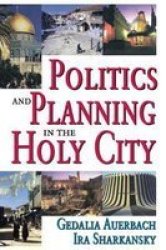Description
Politics and planning in Jerusalem are often in conflict with each other. There are many different interests at play, and it is difficult to come to a consensus on what should be done with the city. This book looks at the various conflicts and how they have arisen.
Jerusalem is not just another city that illustrates the conflict between interests of professional planners and competing political perspectives. It is the Holy City, with a history of some 3,000 years. Moreover, numerous layers of historical remains have importance for intense and competitive religious and national interests. Israelis claim it as the capital of their country, and Palestinians want it--or part of it--as the capital of their not yet created state. Jerusalem is also a place where more than 700,000 people live, and the center of a metropolitan area with more than twice that number. Along with religious and national interests, there are the customary conflicts between what various groups--property developers, politicians, professional planners, neighborhood residents, and environmental activists--want to do with the land. Politics and Planning in the Holy City describes and analyzes the tensions between politics and planning. The authors tackle the economic, social, and political contexts that shape conflicts. Such problems include deciding what should be called "Jerusalem" and difficulties surrounding the construction of a defense barrier to protect Israelis from Palestinian terrorists--in the framework of a multicultural city where 30 to 40 percent of its residents are Palestinians. There is dissent over locating rail lines to the city, as some interests want them here, there, or nowhere, and over building a light rail line within a city already crowded and beset with conflicting interests. The creation of a football stadium is another venue for conflict, as many religious Jews view sports as a threat to their way of life. Issues include locating a site for housing new immigrants, as few Jerusalemites want large numbers of newcomers in their neighborhoods, and deciding which sites merit preservation in a city with many deserving candidates, but severely limited resources. This volume will attract urban specialists as well as those concerned with larger political issues.
Gedalia Auerbach has published several monographs, textbooks, and articles on politics and administration of local government, urban planning, and intergovernmental relations in Israel.
Ira Sharkansky is professor emeritus of political science and public administration at the Hebrew University of Jerusalem. He is author of several works, including
The Political Economy of Israel and
Governing Israel, both available from Transaction
